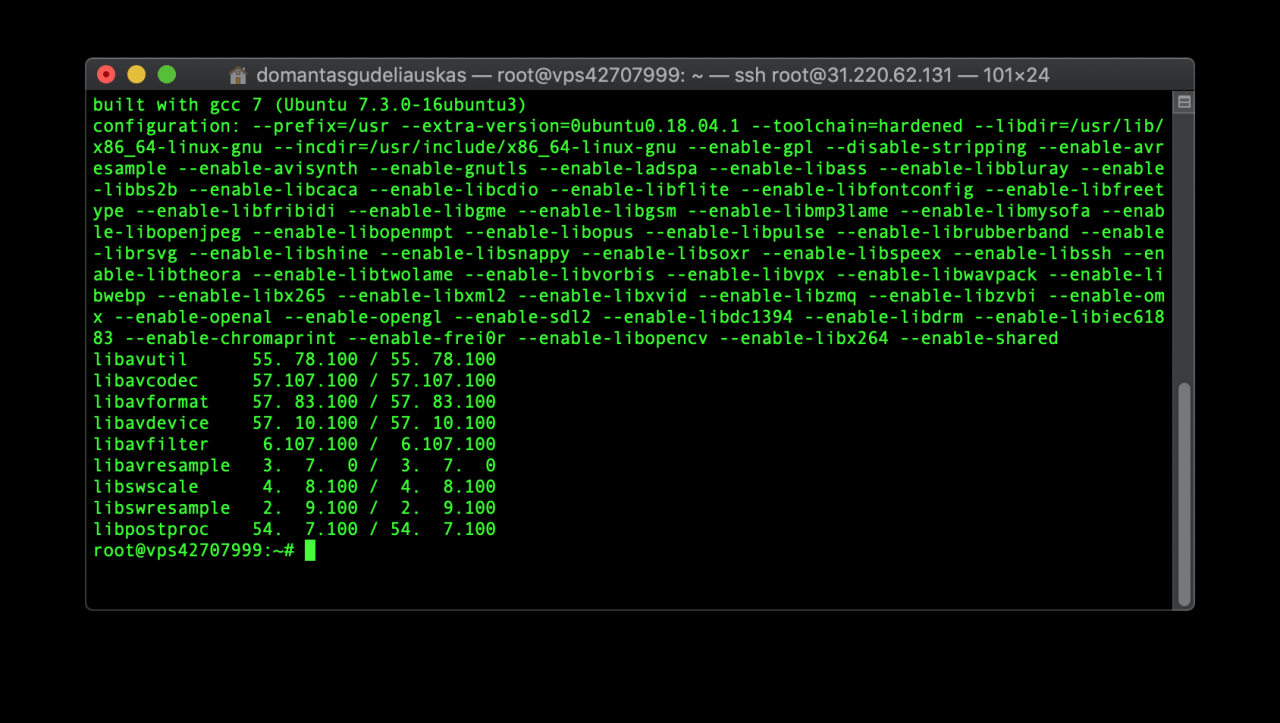

Install ffmpeg from scratch: sudo apt install ffmpegĬhecking the installtion in the base environment: conda env activate baseįfmpeg version 4.2.4-1ubuntu0.1 Copyright (c) 2000-2020 the FFmpeg developersīuilt with gcc 9 (Ubuntu 9.3.0-10ubuntu2)Ĭonfiguration: -prefix=/usr -extra-version=1ubuntu0.1 -toolchain=hardened -libdir=/usr/lib/x86_64-linux-gnu -incdir=/usr/include/x86_64-linux-gnu -arch=amd64 -enable-gpl -disable-stripping -enable-avresample -disable-filter=resample -enable-avisynth -enable-gnutls -enable-ladspa -enable-libaom -enable-libass -enable-libbluray -enable-libbs2b -enable-libcaca -enable-libcdio -enable-libcodec2 -enable-libflite -enable-libfontconfig -enable-libfreetype -enable-libfribidi -enable-libgme -enable-libgsm -enable-libjack -enable-libmp3lame -enable-libmysofa -enable-libopenjpeg -enable-libopenmpt -enable-libopus -enable-libpulse -enable-librsvg -enable-librubberband -enable-libshine -enable-libsnappy -enable-libsoxr -enable-libspeex -enable-libssh -enable-libtheora -enable-libtwolame -enable-libvidstab -enable-libvorbis -enable-libvpx -enable-libwavpack -enable-libwebp -enable-libx265 -enable-libxml2 -enable-libxvid -enable-libzmq -enable-libzvbi -enable-lv2 -enable-omx -enable-openal -enable-opencl -enable-opengl -enable-sdl2 -enable-libdc1394 -enable-libdrm -enable-libiec61883 -enable-nvenc -enable-chromaprint -enable-frei0r -enable-libx264 -enable-sharedĬhecking that its the same in ffmpeg_env: conda activate ffmpeg_envĬonfiguration: -prefix=/usr -extra-version=1ubuntu0. This decision has been reversed so that FFmpeg is available now in Ubuntu 15.04 again.

Sudo apt-get install libx265-dev libnuma-dev FFmpeg has been removed from Ubuntu 14.04 and was replaced by Libav. Sudo apt install libunistring-dev libaom-dev libdav1d-dev
#Ubuntu ffmpeg 4 update#
Get dependencies sudo apt-get update -qq & sudo apt-get -y install \ Uninstalling ffmpeg from Ubuntu sudo apt-get remove ffmpeg FFmpeg on Ubuntu 20. Uninstall ONLY ffmpeg from this environment: conda uninstall ffmpeg -force Note how we're mising configurations such as -enable-libx264 and -enable-libx265 Uninstalling ffmpeg from envionmentĪctivate environment in question: conda activate ffmpeg_env The current issue is that ffmpeg's configuration is in conda, which may looks something like this: (ffmpeg_env) ~ $ ffmpeg -versionįfmpeg version 4.3 Copyright (c) 2000-2020 the FFmpeg developersīuilt with gcc 7.3.0 (crosstool-NG 1.23.0.449-a04d0)Ĭonfiguration: -prefix=/home/wilsonchan/anaconda3/envs/ffmpeg_env -cc=/opt/conda/conda-bld/ffmpeg_1597178665428/_build_env/bin/x86_64-conda_cos6-linux-gnu-cc -disable-doc -disable-openssl -enable-avresample -enable-gnutls -enable-hardcoded-tables -enable-libfreetype -enable-libopenh264 -enable-pic -enable-pthreads -enable-shared -disable-static -enable-version3 -enable-zlib -enable-libmp3lame Step 1: Update your System: Step 2: Run the Installation Command: Step 3: Check the Version of FFmpeg: Step 4: Check the Installed Encoders: Step.
#Ubuntu ffmpeg 4 license#
All static builds available here are licensed under the GNU General Public License version 3. Note: its highly recommended to use git master builds, because bug fixes and other improvements are added daily. For installation instructions please read the FAQ.
#Ubuntu ffmpeg 4 mp4#
Convert a video file from mp4 to webm: $ ffmpeg -i input.mp4 output.webm Welcome Here youll find the latest versions of FFmpeg for Linux kernels 3.2.0 and up.While you convert the audio and video files using ffmpeg it will consider the files format itself. FFmpeg Examplesįollowing are the few basic examples for using the ffmpeg utility. FFmpeg is now installed on your system, and you can start using it. To print all available FFmpeg’s encoders and decoders type: $ ffmpeg -encoders

The output should look something like this: ffmpeg version 4.2.4-1ubuntu0.1 Copyright (c) 2000-2020 the FFmpeg developersīuilt with gcc 9 (Ubuntu 9.3.0-10ubuntu2) To verify the installation, use the ffmpeg -version command, which prints the FFmpeg version: $ ffmpeg -version ffmpeg (7:4.2.4-1ubuntu0.1) focal-security urgencymedium. To install FFmpeg run the following command: $ sudo apt install ffmpeg 3. CVE-2020-21041, Buffer Overflow vulnerability exists in FFmpeg 4.1 via apngdoinverseblend.


 0 kommentar(er)
0 kommentar(er)
